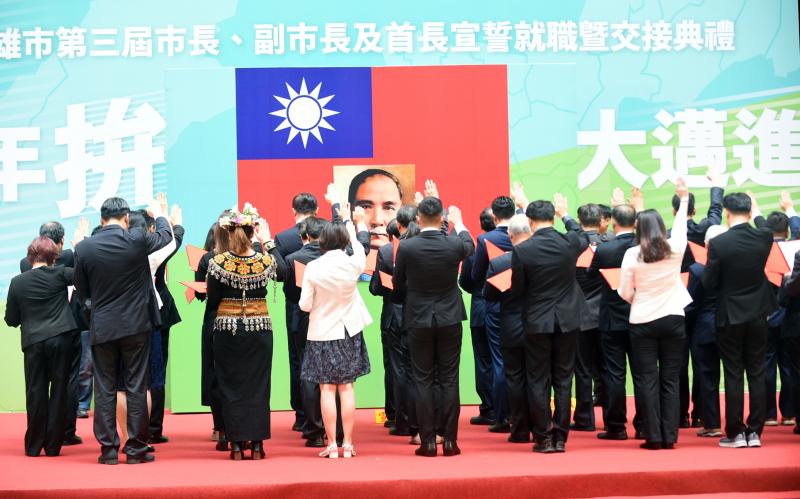Three amendments proposed by Democratic Progressive Party (DPP) lawmakers, which would abolish government tributes to Republic of China (ROC) founder Sun Yat-sen (孫中山), on Friday passed their first reading at the Legislative Yuan, where they are expected to spark controversy among Chinese Nationalist Party (KMT) lawmakers, who have proposed their own amendments.
The DPP amendments to the Presidential and Vice Presidential Oath Act (總統副總統宣誓條例), the Oath Act (宣誓條例) and the National Emblem and National Flag Act (國徽國旗法) are intended to stop the practice of the president, other elected representatives and other officials being sworn into office in front of Sun’s image.
As well, the amendments would no longer require government agencies and schools to have Sun’s image displayed.

Photo: Chang Chung-yi, Taipei Times
Proposed by DPP Legislator Fan Yun (范雲) and other DPP lawmakers, the amendments were introduced after other versions were rejected last month over KMT objections and returned to the legislature’s Procedure Committee.
Fan resent the proposals and they were tackled at the legislature’s plenary session on Friday.
Despite persistent objections from KMT lawmakers, the three proposed amendments passed their first reading, pending reviews at the Judiciary and Organic Laws and Statutes Committee.
Thirty-one KMT lawmakers, led by party Chairman Johnny Chiang (江啟臣), also proposed amendments to the two oath acts, although in a diametrically opposed spirit.
Their proposals would revise the content of oaths of office taken by the vice president, other elected representatives and other officials by adding references to “the ROC” and “the ROC Constitution,” rather than just “the nation” and “the Constitution.”
The presidential oath of office is defined by Article 48 of the Constitution, so is not targeted by the party’s proposals.
The “ROC” is Taiwan’s formal name until a constitutional amendment is passed to change the nation’s name, KMT lawmakers wrote in the proposals.
Highlighting references to the ROC is intended to consolidate the status of the ROC Constitution and prevent those being sworn in from asserting a different stance on national identity, they wrote.
Earlier, Fan said that the KMT proposals clearly target hers.
Fan questioned why KMT lawmakers are wasting time by revising the oaths, as no one would question what “the nation” refers to, but everyone wants to know what the KMT means by “one China,” she said.
Before changing the oaths, KMT lawmakers should use “ROC” in their party’s name, she added.

‘DENIAL DEFENSE’: The US would increase its military presence with uncrewed ships, and submarines, while boosting defense in the Indo-Pacific, a Pete Hegseth memo said The US is reorienting its military strategy to focus primarily on deterring a potential Chinese invasion of Taiwan, a memo signed by US Secretary of Defense Pete Hegseth showed. The memo also called on Taiwan to increase its defense spending. The document, known as the “Interim National Defense Strategic Guidance,” was distributed this month and detailed the national defense plans of US President Donald Trump’s administration, an article in the Washington Post said on Saturday. It outlines how the US can prepare for a potential war with China and defend itself from threats in the “near abroad,” including Greenland and the Panama

A wild live dugong was found in Taiwan for the first time in 88 years, after it was accidentally caught by a fisher’s net on Tuesday in Yilan County’s Fenniaolin (粉鳥林). This is the first sighting of the species in Taiwan since 1937, having already been considered “extinct” in the country and considered as “vulnerable” by the International Union for Conservation of Nature. A fisher surnamed Chen (陳) went to Fenniaolin to collect the fish in his netting, but instead caught a 3m long, 500kg dugong. The fisher released the animal back into the wild, not realizing it was an endangered species at

The Chinese Nationalist Party (KMT) is maintaining close ties with Beijing, the Democratic Progressive Party (DPP) said yesterday, hours after a new round of Chinese military drills in the Taiwan Strait began. Political parties in a democracy have a responsibility to be loyal to the nation and defend its sovereignty, DPP spokesman Justin Wu (吳崢) told a news conference in Taipei. His comments came hours after Beijing announced via Chinese state media that the Chinese People’s Liberation Army’s Eastern Theater Command was holding large-scale drills simulating a multi-pronged attack on Taiwan. Contrary to the KMT’s claims that it is staunchly anti-communist, KMT Deputy

The High Prosecutors’ Office yesterday withdrew an appeal against the acquittal of a former bank manager 22 years after his death, marking Taiwan’s first instance of prosecutors rendering posthumous justice to a wrongfully convicted defendant. Chu Ching-en (諸慶恩) — formerly a manager at the Taipei branch of BNP Paribas — was in 1999 accused by Weng Mao-chung (翁茂鍾), then-president of Chia Her Industrial Co, of forging a request for a fixed deposit of US$10 million by I-Hwa Industrial Co, a subsidiary of Chia Her, which was used as collateral. Chu was ruled not guilty in the first trial, but was found guilty